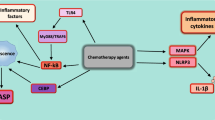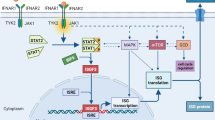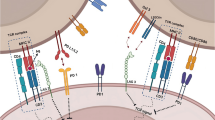Abstract
The realization that prostate cancer is an immunogenic tumor, in conjunction with the discovery of novel methods for priming the immune system to generate an antitumor response, has resulted in several new approaches for prostate cancer immunotherapy. Based on these various approaches, several human clinical trials have begun using immune-based therapies for prostate cancer. These approaches can be divided into cytokine-based therapies, tumor-associated antigen-based therapies, tumor vaccines, and dendritic cell-based therapies. This review summarizes the latest findings from each of these approaches and gives results from the few completed human clinical trials.
Similar content being viewed by others
References and Recommended Reading
Sokoloff MH, Tso CL, Kaboo R, et al.: In vitro modulation of tumor progression-associated properties of hormone refractory prostate carcinoma cell lines by cytokines. Cancer 1996, 77:1862.
Steiner MS, Gingrich JR: Gene therapy for prostate cancer: where are we now? J Urol 2000, 164:1121.
Morgan DA, Ruscetti FW, Gallo R: Selective in vitro growth of T lymphocytes from normal human bone marrows. Science 1976, 193:1007.
Hautmann SH, Huland E, Huland H: Local intratumor immunotherapy of prostate cancer with interleukin-2 reduces tumor growth. Anticancer Res 1999, 19:2661.
Kocheril SV, Grignon DJ, Wang CY, et al.: Responsiveness of human prostate carcinoma bone tumors to interleukin-2 therapy in a mouse xenograft tumor model. Cancer Detect Prev 1999, 23:408.
Maffezzini M, Simonato A, Fortis C: Salvage immunotherapy with subcutaneous recombinant interleukin 2 (rIL-2) and alpha-interferon (A-IFN) for stage D3 prostate carcinoma failing second-line hormonal treatment. Prostate 1996, 28:282.
National Cancer Institute: Cancer clinical trials. Accessible at http://cancertrials.nci.nih.gov/system. Accessed April 13, 2001. This is an up-to-date web site that includes all completed and on-going human clinical trials for prostate cancer.
Kawakita M, Rao GS, Ritchey JK, et al.: Effect of canarypox virus (ALVAC)-mediated cytokine expression on murine pros-tate tumor growth. J Natl Cancer Inst 1997, 89:428.
Trachtenberg J, Dancey J, Toi H, et al.: A phase I trial of adenovector mediated delivery of interleukin-2 (AdCAIL-2) in locally advanced prostate cancer. J Urol 2000, 163:261.
Felgner PL, Gadek TR, Holm M, et al.: Lipofection: a highly efficient, lipid-mediated DNA-transfection procedure. Proc Natl Acad Sci U S A 1987, 84:7413.
Belldegrun A, Tso CL, Zisman A, et al.: Interleukin 2 (IL-2) gene therapy for prostate cancer (CaP): phase I clinical trial and basic biology. Hum Gene Ther, In Press. This is the first study to deliver the IL-2 directly to the prostate using cationic lipids. This study demonstrates the relative safety of this type of therapy, and also shows it to be capable of local and systemic immune activation.
Small EJ, Reese DM, Um B, et al.: Therapy of advanced prostate cancer with granulocyte macrophage colony-stimulating factor. Clin Cancer Res 1999, 5:1738.
Harris DT, Matyas GR, Gomella LG, et al.: Immunologic approaches to the treatment of prostate cancer. Semin Oncol 1999, 26:439.
Kim JJ, Trivedi NN, Wilson DM, et al.: Molecular and immuno-logical analysis of genetic prostate specific antigen (PSA) vaccine. Oncogene 1998, 17:3125.
Hodge JW, Schlom J, Donohue SJ, et al.: A recombinant vaccinia virus expressing human prostate-specific antigen (PSA): safety and immunogenicity in a non-human primate. Int J Cancer 1995, 63:231.
Sanda MG, Smith DC, Charles LG, et al.: Recombinant vaccinia-PSA (PROSTVAC) can induce a prostate-specific immune response in androgen-modulated human prostate cancer. Urology 1999, 53:260.
Eder JP, Kantoff PW, Roper K, et al.: A phase I trial of a recombinant vaccinia virus expressing prostate-specific antigen in advanced prostate cancer. Clin Cancer Res 2000, 6:1632. This paper reports the results of a PSA vaccine using the vaccinia virus. This paper demonstrated a lack of significant toxicity and that the vaccine was able to induce specific immunity to PSA peptides.
Mincheff M, Tchakarov S, Zoubak S, et al.: Naked DNA and adenoviral immunizations for immunotherapy of prostate cancer: a phase I/II clinical trial. Eur Urol 2000, 38:208.
Meidenbauer N, Harris DT, Spitler LE, et al.: Generation of PSA-reactive effector cells after vaccination with a PSA-based vaccine in patients with prostate cancer. Prostate 2000, 43:88.
Pantuck AJ, van Ophoven A, Gitlitz BJ, et al.: MUC-1/IL-2 gene therapy for advanced prostate cancer: phase I trial and clinical response associated systemic immune activation. J Urol 2000, 163:158.
Peat N, Gendler SJ, Lalani N, et al.: Tissue-specific expression of a human polymorphic epithelial mucin (MUC1) in transgenic mice. Cancer Res 1992, 52:1954.
Hareuveni M, Tsarfaty I, Zaretsky J, et al.: A transcribed gene, containing a variable number of tandem repeats, codes for a human epithelial tumor antigen. cDNA cloning, expression of the transfected gene and over-expression in breast cancer tissue. Eur J Biochem 1990, 189:475.
Kirschenbaum A, Itzkowitz SH, Wang JP, et al.: MUC1 expression in prostate carcinoma: correlation with grade and stage. Mol Urol 1999, 3:163.
von Mensdorff-Pouilly S, Gourevitch MM, Kenemans P, et al.:Humoral immune response to polymorphic epithelial mucin (MUC-1) in patients with benign and malignant breast tumours. Eur J Cancer 1996, 32A:1325.
Sanda MG, Ayyagari SR, Jaffee EM, et al.: Demonstration of a rational strategy for human prostate cancer gene therapy. J Urol 1994, 151:622.
Nelson WG, Simons JW, Mikhak B, et al.: Cancer cells engineered to secrete granulocyte-macrophage colony-stimulating factor using ex vivo gene transfer as vaccines for the treatment of genitourinary malignancies. Cancer Chemother Pharmacol 2000, 46:S67.
Simons JW, Mikhak B, Chang JF, et al.: Induction of immunity to prostate cancer antigens: results of a clinical trial of vaccination with irradiated autologous prostate tumor cells engineered to secrete granulocyte-macrophage colony-stimulating factor using ex vivo gene transfer. Cancer Res 1999, 59:5160. This study reports the results of the first human clinical trial for immunotherapy of prostate cancer. This paper showed that tumor vaccines can induce immunity to prostate cancer antigens.
Kwon ED, Hurwitz AA, Foster BA, et al.: Manipulation of T cell costimulatory and inhibitory signals for immuno-therapy of prostate cancer. Proc Natl Acad Sci U S A 1997, 94:8099.
Hull GW, McCurdy MA, Nasu Y, et al.: Prostate cancer gene therapy: comparison of adenovirus-mediated expression of interleukin 12 with interleukin 12 plus B7-1 for in situ gene therapy and gene-modified, cell-based vaccines. Clin Cancer Res 2000, 6:4101.
Cella M, Sallusto F, Lanzavecchia A: Origin, maturation and antigen presenting function of dendritic cells. Curr Opin Immunol 1997, 9:10.
Steinman RM: The dendritic cell system and its role in immunogenicity. Annu Rev Immunol 1991, 9:271.
Caux C, Dezutter-Dambuyant C, Schmitt D, et al.: GM-CSF and TNF-alpha cooperate in the generation of dendritic Langerhans cells. Nature 1992, 360:258.
Romani N, Gruner S, Brang D, et al.: Proliferating dendritic cell progenitors in human blood. J Exp Med 1994, 180:83.
Gong J, Chen D, Kashiwaba M, et al.: Induction of antitumor activity by immunization with fusions of dendritic and carcinoma cells. Nat Med 1997, 3:558. Although this paper is not specifically related to prostate cancer, it demonstrates a rational approach to fuse dendritic cells to tumor cells. This method has been used successfully in several models to generate specific antitumor immunity.
Kugler A, Stuhler G, Walden P, et al.: Regression of human metastatic renal cell carcinoma after vaccination with tumor cell-dendritic cell hybrids. Nat Med 2000, 6:332.
Nestle FO, Burg G, Fah J, et al.: Human sunlight-induced basal-cell-carcinoma-associated dendritic cells are deficient in T cell co-stimulatory molecules and are impaired as antigen-presenting cells. Am J Pathol 1997, 150:641.
Mulders P, Tso CL, Gitlitz B, et al.: Presentation of renal tumor antigens by human dendritic cells activates tumor-infiltrating lymphocytes against autologous tumor: implications for live kidney cancer vaccines. Clin Cancer Res 1999, 5:445.
Paglia P, Chiodoni C, Rodolfo M, et al.: Murine dendritic cells loaded in vitro with soluble protein prime cytotoxic T lymphocytes against tumor antigen in vivo. J Exp Med 1996, 183:317.
van Elsas A, van der Burg SH, van der Minne CE, et al.: Peptide-pulsed dendritic cells induce tumoricidal cytotoxic T lymphocytes from healthy donors against stably HLA-A* 0201-binding peptides from the Melan-A/MART-1 self antigen. Eur J Immunol 1996, 26:1683.
Boczkowski D, Nair SK, Snyder D, et al.: Dendritic cells pulsed with RNA are potent antigen-presenting cells in vitro and in vivo. J Exp Med 1996, 184:465.
Brossart P, Goldrath AW, Butz EA, et al.: Virus-mediated delivery of antigenic epitopes into dendritic cells as a means to induce CTL. J Immunol 1997, 158:3270.
Dietz AB, Vuk-Pavlovic S: High efficiency adenovirus-mediated gene transfer to human dendritic cells. Blood 1998,Blood199891:392.
Celluzzi CM, Mayordomo JI, Storkus WJ, et al.: Peptide-pulsed dendritic cells induce antigen-specific CTL-mediated protective tumor immunity. J Exp Med 1996, 183:283.
Murphy GP, Tjoa BA, Simmons SJ, et al.: Infusion of dendritic cells pulsed with HLA-A2-specific prostate-specific membrane antigen peptides: a phase II prostate cancer vaccine trial involving patients with hormone-refractory metastatic disease. Prostate 1999, 38:73.
Murphy GP, Tjoa BA, Simmons SJ, et al.: Phase II prostate cancer vaccine trial: report of a study involving 37 patients with disease recurrence following primary treatment. Prostate 1999, 39:54.
Tjoa BA, Erickson SJ, Bowes VA, et al.: Follow-up evaluation of prostate cancer patients infused with autologous dendritic cells pulsed with PSMA peptides. Prostate 1997, 32:272.
Tjoa BA, Simmons SJ, Elgamal A, et al.: Follow-up evaluation of a phase II prostate cancer vaccine trial. Prostate 1999, 40:125. This paper is one of a series reporting results from two phase II trials using dendritic cells pulsed with PSMA peptides. These two trials, taken together, found that dendritic cells pulsed with PSMA peptides resulted in a significant reduction in PSA in almost one third of patients.
Murphy GP, Tjoa BA, Simmons SJ, et al.: Higher-dose and less frequent dendritic cell infusions with PSMA peptides in hormone-refractory metastatic prostate cancer patients. Prostate 2000, 43:59.
Small EJ, Fratesi P, Reese DM, et al.: Immunotherapy of hormone-refractory prostate cancer with antigen-loaded dendritic cells. J Clin Oncol 2000, 18:3894.
Heiser A, Dahm P, Yancey DR, et al.: Human dendritic cells transfected with RNA encoding prostate-specific antigen stimulate prostate-specific CTL responses in vitro. J Immunol 2000, 164:5508.
Salgaller M, Elgamal AA, Shankar G, et al.: Immunotherapy of prostate cancer consisting of dendritic cells and prostae-specific membrane antigen: In Fed Clin Immuno Soc Boston, MA., 2001.
Lamb HM, Faulds D: Capromab pendetide. A review of its use as an imaging agent in prostate cancer. Drugs Aging 1998, 12:293.
Deb N, Goris M, Trisler K, et al.: Treatment of hormone-refractory prostate cancer with 90Y-CYT-356 monoclonal antibody. Clin Cancer Res 1996, 2:1289.
Huang SM, Harari PM: Epidermal growth factor receptor inhibition in cancer therapy: biology, rationale and preliminary clinical results. Invest New Drugs 1999, 17:259.
Scher HI, Sarkis A, Reuter V, et al.: Changing pattern of expression of the epidermal growth factor receptor and transforming growth factor alpha in the progression of prostatic neoplasms. Clin Cancer Res 1995, 1:545.
Prewett M, Rockwell P, Rockwell RF, et al.: The biologic effects of C225, a chimeric monoclonal antibody to the EGFR, on human prostate carcinoma. J Immunother Emphasis Tumor Immunol 1996, 19:419.
Slovin SF, Kelly WK, Cohen R, et al.: Epidermal growth factor receptor (EGFr) monoclonal antibody (MoAb) C225 and doxorubicin (DOc) in androgen-independent (AI) prostate cancer (PC): results of a phase Ib/Iia study. Proc Am Soc Clin Oncol 1997, 1108.
Author information
Authors and Affiliations
Rights and permissions
About this article
Cite this article
Freedland, S.J., Pantuck, A.J., Weider, J. et al. Immunotherapy of prostate cancer. Curr Urol Rep 2, 242–247 (2001). https://doi.org/10.1007/s11934-001-0086-9
Issue Date:
DOI: https://doi.org/10.1007/s11934-001-0086-9




